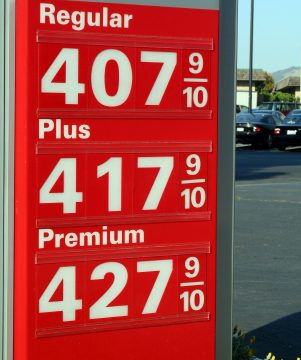The Solution To High Gas Prices Is Less Government, Not More

There’s a lot of consternation nationally about gas prices this spring, but that’s usually the case. As one of the most visible economic indicators in the market, it seems like gas prices are always making people gripe, especially when the inevitable summer price hikes come.
This spring the angst seems particularly acute, especially in North Dakota which is enjoying (if that’s the word for it) some of the highest gas prices in the continental United States.
The price hikes were apparently caused by refinery outages, some planned and some not planned, and now North Dakota Senator John Hoeven (joining with Minnesota Democrat Amy Klobuchar) thinks he’s got a solution. He wants refiners to report when their outages will be to the federal government.
Partnering with Sen. Amy Klobuchar, D-Minn., Sen. John Hoeven, R-N.D., was an original cosponsor of a bill last month to attempt to address the issue of high gas prices resulting from shortages in supply. Klobuchar formally introduced the legislation — which calls for refineries to report their maintenance schedule to the Department of Energy to prevent simultaneous closings — Thursday.
A spokesperson for Hoeven’s office said in an email Friday that the senator “believes the legislation is necessary and could help to control spikes in gas prices due to scheduled maintenance and unscheduled repairs.” The spokesperson added Hoeven will “work with Sen. Klobuchar to get the bill to the Senate floor.”
Both Hoeven and Klobuchar sent letters last month to DOE Secretary Ernest Moniz, asking him to use existing laws to help coordinate planned refinery shutdowns and maintenance schedules.
So Hoeven’s solution to gas prices is to give the government veto power over refinery operations? Why don’t we just have the government take over the refining industry? That way they could manage the refinery outages for us. I’m sure that would be a lot more efficient, right?
All joking aside, it’s worth remembering that politicians like Hoeven and Klobuchar are very much a price of the gas price problem. Those prices will always go up and down given the inherently volatile nature of the petroleum markets, but let’s remember that the government has stuck refiners with a mandate for renewable fuels which is making their jobs harder and more costly.
Ethanol is a worthless fuel few Americans want – just 4% of Americans who have flex fuel vehicles capable of burning an 85% ethanol fuel blend use that fuel more than once – yet the federal government has decided that refiners must produce it anyway.
The Renewable Fuels Standard, beloved by farmers for driving up crop prices (there’s a troubling bubble in farm land values that almost nobody is talking about), is also driving up the cost of refining in a big way as refiners figure out how to meet federal standards for producing a fuel that’s all but impossible to sell:
Each year, fuel refiners and importers must demonstrate to the EPA that they have blended RFS-designated amounts of ethanol into fuel. But due to lack of consumer demand for fuels like E15 and E85, as well as the constraints of the infrastructure needed to transport, store and dispense fuel, refiners are simply unable to meet RFS targets. To close the gap and show compliance with RFS to the EPA, refiners as obligated parties must purchase ethanol credits known as Renewable Identification Numbers (RINs) on the open market, assuming another refiner or blender was able to sell extra ethanol.
RINs are not free.
These credits, representing each gallon of ethanol produced, have increased in price from just 2-3 cents at the end of 2012 to more than $1 per gallon earlier in recent weeks, which add substantially to refiners’ operating costs.
Who, ultimately, do you think is paying the cost of those RIN’s? The refiners may pay them up front, but the cost is passed along to consumers.
It’s fashionable to believe spiking gas prices are the result of oil industry conspiracies, and to be sure if there’s one thing we can all agree on it’s that the oil industry likes to make money. But gas prices would be far less volatile, and far less inflated, if the government would roll back policies like the RFS. Or quit sandbagging energy infrastructure projects like the Keystone XL pipeline.
Like it or not, America runs on oil, and the more rigid we make the oil markets with mandates, regulations and taxes the more the use of oil is going to cost us.







